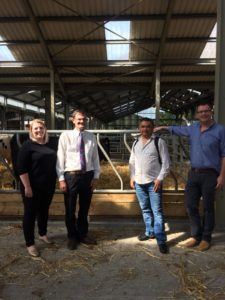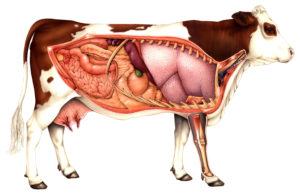Profile
Kieran
My CV
-
Education:
Primary in Scoil Mhuire, Shankill, Co. Dublin; Secondary in Holy Child Sallynoggin and St. Laurence College Loughlinstown; Degree in UCD; PhD in UCD
-
Qualifications:
A degree in Animal Science and a doctorate in Molecular Genetics
-
Work History:
I worked in St. Vincents Hospital, Trinity College Dublin and Teagasc
-
Current Job:
I run a research group
-
About Me
I am an animal scientist
-
Read more

Me on the right
I grew up in the Dublin suburbs, and was always passionate about animals. My relations have farms so I was always on buses up and down the country to milk cows and dose sheep. I used to run from milking cows on my uncles farm down across the field to the next farmer who milked jersey cows and I never got sick of it. My uncle bought me a ewe and used to send me the money he got from her lamb every year. Years later I learned that she always had twins but he kept the money from the second one for himself! 🙁
My parents bought me a cocker spaniel dog, and I saved up for another so I could breed them and I sold the puppies. I remember during my leaving certificate the female dog (called a bitch) got an infection and I had to syringe feed the pups every two hours on artificial milk. The dog was pure golden and the bitch was pure black, but the pups were either one colour or the other and not a mix, so that got me thinking about genetics. I loved James Herriott when I was growing up and I wanted to be a vet when I left school but missed the points, so I did Animal Science instead in UCD.
As part of my degree I worked in a breeding station in Mallow, Co. Cork, collecting samples from breeding bulls. This gave me more interest in genetics and after UCD, I started a PhD with a new professor that has moved to UCD from Trinity College Dublin. I hadn’t a clue what a PhD was, as no one in my immediate family had gone to college before. Basically, a PhD allows you to study something in real detail and find answers to questions that no one else previously knew! As part of my work, I got to study the genetics of diseases, including TB, which is a big problem for agriculture. It is also an issue for humans, with almost one third of the people in the world infected!
Anyway, as part of my studies, I got to work on a disease that affects cattle (and people) in Africa, called sleeping sickness. So I got to travel to Kenya, which was amazing. The people, the cattle, the wildlife, I have such good memories. On my return I got my PhD (now I was a Doctor) and got a job as a postdoctoral scientist – basically a research job after your PhD. This job was in St. Vincent’s hospital in Dublin where I worked on animals diseases, specifically those which are important for the food chain and for human health.
So it dawned on me how important diseases in animals are for all of us. It also helped me realize how important the job that farmers do is, to protect us all. So that set me up on the direction I now follow – as a leader of a research group in Teagasc. Teagasc is the agricultural authority in Ireland and through my research work, I get to find out new aspects about diseases in livestock – and who knows, one of those clues might lead us to a way to fight them off more successfully!
-
Read more
I run a research group – so that means you need to bring together new ideas and people together to find solutions for diseases in livestock.
Sounds simple but requires a lot of steps – I need to identify the problem (usually the easy bit!), then I need to come up with a potential solution (not so easy!) – something that has not been done before; then I need to write a grant to show how I will tackle the issue; that grant is reviewed by other scientists to ensure it makes sense and is the best way to tackle the issue; then (hopefully) it is funded; then I recruit students to work on it. Then we run the experiment, collect the samples, perform the analysis and publish the results. Scientists tend to be optimists – we always think we have the answer; and when we don’t, we dust ourselves off and try again. It is never failure as even if we don’t get the answer we would like, we have contributed to the body of knowledge, and trained some great next-generation scientists.
Thankfully we work with some great partners – called collaborators, and working with excited, engaged, enthusiastic and smart people makes it worthwhile, and helps a lot!
So that is my job in a nutshell. It involves animal work (taking samples); laboratory work (analysing samples); computer work (analysing data) and writing papers; as well as presentations at conferences.
I am give lectures in a couple of universities (Trinity, UCD and NUIG) as well as Institutes of Technology (DKIT). I love teaching and helping young minds understand what can be complex concepts.
-
My Typical Day
A real mix of interesting things
-
Read more
No two days are the same but I try to get some quiet time to help me focus on the tasks at hand, which is not always easy!
I start by checking my emails – which usually include a couple of emails sent to myself to remind me to do things.
Then I would meet up with my students to help troubleshoot any issues that they are having and order any consumables (which are things they need to do their work in the lab). This could include enzymes, cells for cell culture and chemicals to keep those cells happy and fed. I have a research group of 4 PhD students and a postdoctoral scientist. I often have an undergraduate student form a university doing work experience in our laboratory also.
Then I usually work on a research paper – we always have papers at different stages of preparation and our productivity is often measured in terms of the numbers and quality of papers that we produce. These are essential to communicate our results to our scientific peers. If the results are good that can be exciting, if not, it is still important to publish to prevent someone else exploring the same avenue.
After lunch, I might be meeting with collaborators to discuss new projects and write new grant proposals. These grants go to Teagasc, or the government or sometimes to the EU.
This week I am also involved in organizing the Science Week events for Teagasc, which involves primary school and second level students.
On other days I might have to dash to a University to give a lecture, which we now do sometimes by Skype and that saves my legs, and diesel!
-
What I'd do with the prize money
Buy a tiny camera for calf to swallow so we can see inside
-
My Interview
-
How would you describe yourself in 3 words?
Animal mad, Immune-enthusiast, One-Healther
What did you want to be after you left school?
A Veterinary Surgeon
Were you ever in trouble at school?
Eh.....yes
Who is your favourite singer or band?
I just bought tickets for Pink...
What's your favourite food?
Has to be Fillet steak!
What is the most fun thing you've done?
Gone on safari in Africa
If you had 3 wishes for yourself what would they be? - be honest!
To be fitter, to go back to Africa and to be happy!
Tell us a joke.
Did you hear about the bones recently found on the moon? It seems a cow didn't make it! :)
-
-
Work photos:

COW ANATOMY, DRAWING

